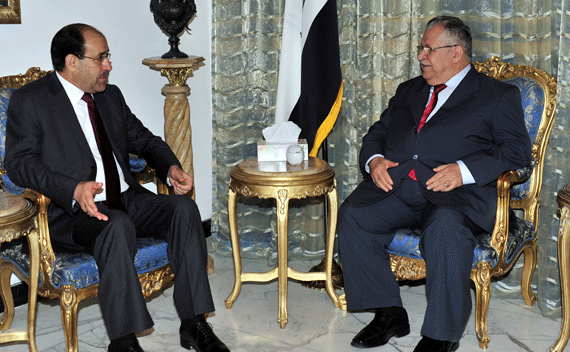More on:

Yesterday, Prime Minister Nouri al-Maliki, President Jalal Talabani, and other senior Iraqi political leaders held a five-hour meeting to discuss what role, if any, the U.S. military would play in Iraq after 2011. Under the Status of Forces Agreement (SOFA), which was signed by the George W. Bush administration and the government of Iraq in November 2008, “All the United States Forces shall withdraw from all Iraqi territory no later than December 31, 2011.”
On Monday, Adm. Michael Mullen, Chairman of the Joint Chiefs of Staff, had met with the Prime Minister to reemphasize that the United States needed a decision “very quickly” regarding U.S. troops. Mullen warned at a Baghdad press conference, “With respect to the forces…a significant part of this is just a physics problem: You get to a point in time where you just can’t turn back, and all the troops must leave. That’s why it’s so important to make the decision absolutely as soon as possible.”
U.S. military officials looking for decisive action on this issue were surely disappointed with what Iraq’s political leaders agreed to. Rather than deny or formally request that U.S. troops stay beyond 2011, Iraq’s leaders “agreed to let the Iraqi government start negotiations with the American side only on the issues of training and under the [SOFA]," Iraqi Deputy Prime Minister Ruz Nouri Shawees told reporters. He added, "The Iraqi political leaders will be watching the talks to consider any final agreement with the U.S. side."
The reason that the fractured political blocs cannot reach a consensus on the issue is that most Iraqis want an end to the American military presence. Reporting from Baghdad, Tim Arango of the New York Times wrote yesterday: “American diplomats, citing polls that aren’t public, say the majority of Iraqis have a negative view of the American role in Iraq.” Just as there were public celebrations when U.S. combat forces withdrew from all cities and villages in June 2009, most Iraqis want the SOFA to be fully implemented with all U.S. soldiers out of the country by year’s end.
After the latest announcement from Baghdad, and with just 59 days before the State Department assumes full responsibility for all U.S. government employees in Iraq, there are three points worth noting.
First, an agreement by the Iraqi government to begin negotiating a role for U.S. military forces in the coming years is just that, the start of talks. Discussions could be further delayed or bogged down over highly-sensitive issues, such as an assurance of legal immunity from prosecution for U.S. soldiers and the eventual ratification of any future SOFA by the Iraqi Parliament. As Foreign Minister Hoshyar Zebari noted yesterday evening, "There aren’t any foregone conclusions."
Second, while U.S. military officials have hinted that Iraq could serve as a launching pad for special operations raids against Iranian-backed Shia militias, Iraq’s leaders envision that if U.S. troops remain they will be permitted to engage only in training and advising missions. An important question to be resolved is whether U.S. troops will partner with their Iraqi counterparts for joint missions, like the Iraqi-U.S. night raid in Al Rufait last weekend, which reportedly failed to capture the targeted Al Qaeda in Iraq suspect but accidentally killed three men and wounded five, among them two young girls.
Third, it is apparent that any U.S. troops in Iraq after 2011 will not be tasked with trying to limit the flow of Iranian-supplied rockets or improvised explosive devices. This mission is best suited for the Ministry of Interior’s police and border forces. Furthermore, trying to stop cross-border smuggling was never a mission that the U.S. military welcomed or accomplished. As Lt. Gen. Mike Oates (ret.), the former commander of U.S. forces in southern Iraq stated last week: “There have been no reported incidents in which American forces have actually interdicted Iranian munitions while in transit. That should tell you something about just how hard this is to stop.”
More on: